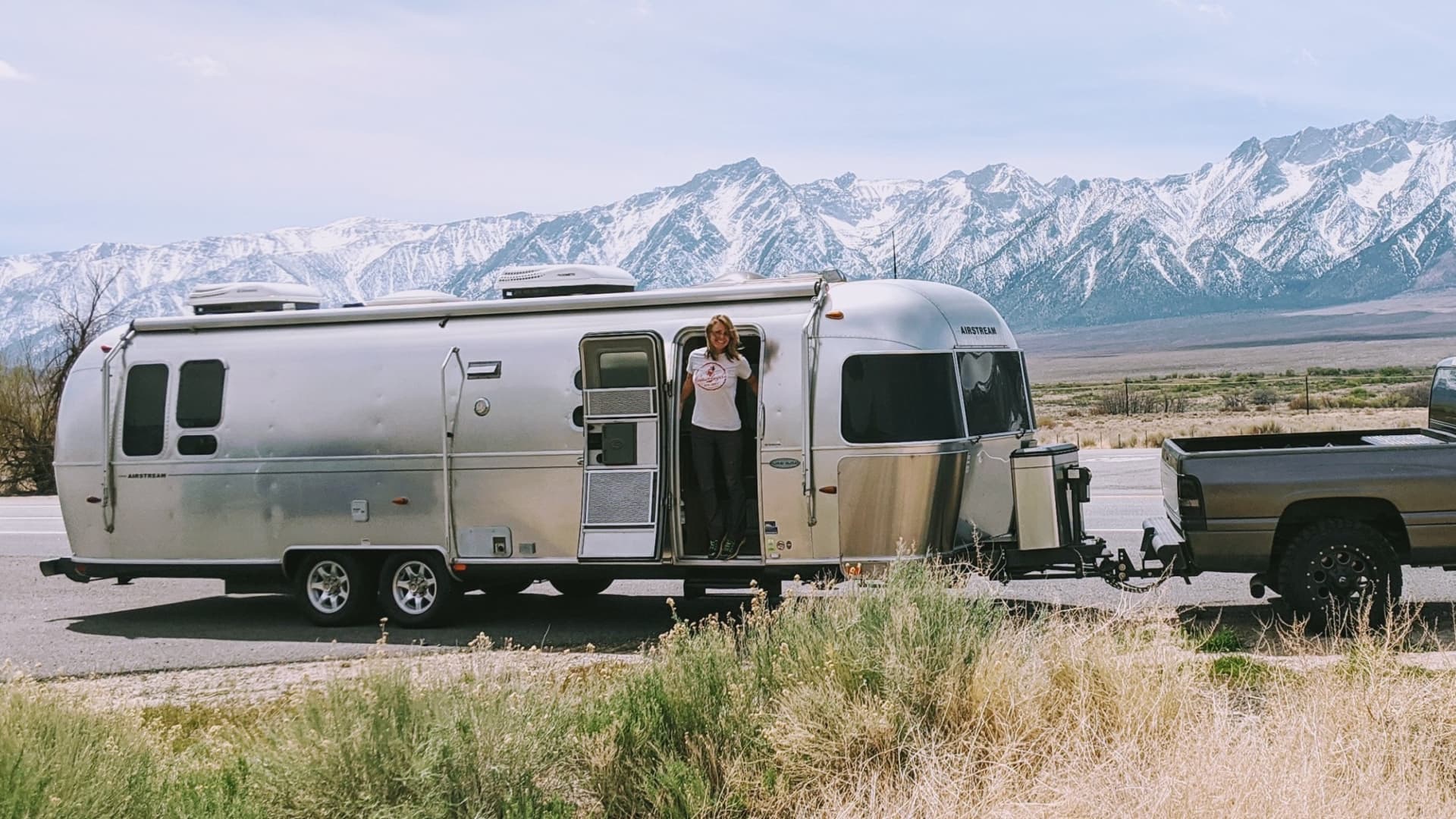
As millennials begin to turn 40 in 2021, CNBC Make It has launched Middle-Aged Millennials, a series exploring how the oldest members of this generation have grown into adulthood amid the backdrop of the Great Recession and the Covid-19 pandemic, student loans, stagnant wages and rising costs of living.
Around five years ago, dissatisfied with lives spent "chasing the dollar," Kelli and Charlie Compton quit their jobs as a salon owner and a manager at an equipment rental company, respectively, in North Carolina, sold most of their belongings, and hit the open road in an Airstream travel trailer.
Working as seasonal campground hosts at sites in California, Colorado, Utah, Wyoming and other states, Kelli, 35, and Charlie, 36, have become distinctly aware of how climate change is disrupting different types of ecosystems and habitats across the U.S. Escalating wildfires in California over the past few years and the Rocky Mountain National Park area in 2020 were particularly devastating to them, according to Kelli, and brought climate change "to the forefront of our minds."
As a result, they do as much as they can to minimize their carbon footprint, Kelli tells CNBC Make It. That includes cooking most of their meals, wearing clothes to tatters and using a composting toilet, which doesn't require water to flush, in their 30-foot trailer. The couple has decided not to have children due to climate concerns. "The earth is groaning," she says.
Get Tri-state area news and weather forecasts to your inbox. Sign up for NBC New York newsletters.
They make significantly less money now — pulling in around $40,000 last year, compared with $150,000 in their previous life, Kelli says — but they are happier and healthier, and get by comfortably on their new income because their current lifestyle requires less of everything. The couple initially planned to set out for a year; now, they don't intend to go back.
"We didn't necessarily get into this lifestyle because we wanted to be responsible citizens of the Earth," she says. "But now, looking at our carbon footprint, this is something we can really be proud of."

The Comptons are an extreme example — few people are willing to rearrange their entire lives to reduce their carbon footprint — but experts say climate change is increasingly impacting millennials' financial decisions as they approach middle age.
Local
Around 76% of older millennials, ages 33 to 40, think climate change poses a serious threat to society, according to a survey conducted by The Harris Poll on behalf of CNBC Make It in March that surveyed 1,000 U.S. adults on a variety of topics.
Many members of the generation have grown up viewing climate change as an existential threat, worrying about global sea level rise, and witnessing one ecological disaster after another. Now as they settle into careers and family life, climate concerns are influencing how they spend their money, from investing to homebuying to the products they use and companies they support.
Bearing a 'transitional burden'
Climate change is a top issue millennials consider when they pick investments or look into buying real estate, says Dann Ryan, a certified financial planner at Sincerus Advisory in New York City who advises millennial clients. It can impact small habits, like consuming less or preferring sustainable brands, and big life choices, like whether or not to have children, he says.
At 35, Ryan is an older millennial himself, and says he and other members of his generation are doubling down on sustainability "because we have to."
Ryan describes millennials as carrying a "transitional burden" between the unsustainable habits of baby boomers and Gen X, like increased consumption, and the more socially and environmentally conscious Gen Z. Older millennials feel they need to atone for the mistakes of previous generations, he says, while leading the way for the next generation and setting up a sustainable future for themselves and their children.
"My clients come from modest backgrounds, and feel this burden with their newfound wealth," Ryan says. "They feel a responsibility to do something with it for society," such as investing in companies that are taking steps to lessen their environmental impact.
Jovan Johnson, a certified financial planner at Piece of Wealth Planning in Atlanta, agrees. His millennial clients are particularly interested in sustainable investments, solar power for their homes and even tax credits for electric cars, he says. Those topics come up less with older clients who are closer to retirement.
"Younger clients want to have an impact," Johnson says. They seem to feel more acutely than older generations that what they do will impact their children and grandchildren, he adds.
And now that more millennials are parents, Johnson says they are more future thinking. That makes all of their financial decisions more weighted: It feels like how they spend their money is an indication of what they want the future of the planet to be. "People are realizing their dollars are making a difference," Johnson says.
Caring about these issues has become "more of [millennials'] legacy than it has for other generations," adds Harlin Singh, head of sustainable investments at Citi Private Bank, both on a moral and practical level. From insurance costs to food and energy prices, climate change is already affecting certain aspects of millennials' lives, Singh says.
"The reality is millennials are 40, and they're going to be here for another 40 to 60 years. You're always concerned about what is going to be going on in your lifetime," Singh says. Millennials expect that they will experience the financial repercussions of climate change events like rising sea levels in their lifetimes.
Kelli Compton doesn't begrudge anyone making more traditional career and housing decisions; the Airstream lifestyle is not for everyone. But at the same time, she says there are simple things anyone can do to reduce their carbon footprint, such as buying fewer new things overall. And, at least in her experience, those changes have made her and her husband happier overall.
"Does my one composting toilet change the world? No, it doesn't. Do I feel like I need to make changes where I can? I do," she says. "Making less money and living on a smaller carbon footprint feels like a solution for our family."
CNBC Make It will be publishing more stories in the Middle-Aged Millennials series around student loans, employment, wealth, diversity and health. If you're an older millennial (ages 33 to 40), share your story with us for a chance to be featured in a future installment.
Sign up now: Get smarter about your money and career with our weekly newsletter
Check out: Meet the middle-aged millennial: Homeowner, debt-burdened and turning 40



